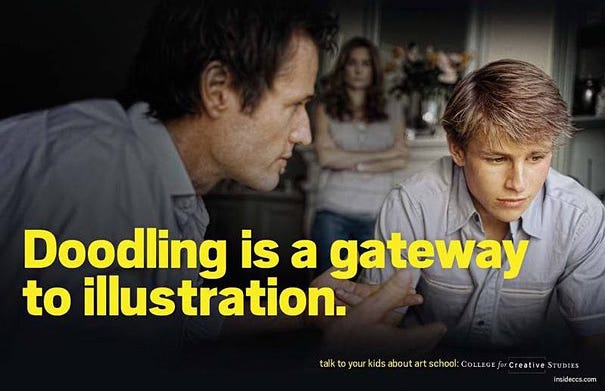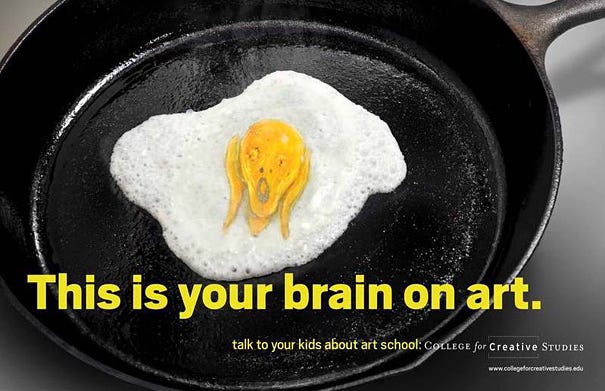How the DARE Campaign Failed To Keep Teens Off Drugs
Apparently I was the only GenXer who just said no
I’m kidding, of course. I’m obviously not the only GenXer who just said no to illegal street drugs and said yes to a clean lifestyle full of vegetables, sunscreen, and the postponement of adulting. Minus the handful of times I took a hit from the weed that was passed around at a party, I avoided hard drugs because, well, I was terrified of them. I had no desire for my brain to fry like an egg.
“Any questions?” Nope, I’m good
The DARE campaign was Nancy Reagan’s darling, fueled by the “war on drugs”. She collaborated with the Los Angeles Police Department in 1983 to have cops visit schools to teach kids why they should “just say no” when drugs are offered and the legal consequences awaiting them if they conform to that pressure. For the oldest GenXers this all came too late, as they were already young adults graduating high school, but I was in the 3rd grade that year so I saw and heard it all.
Over the years, teachers and law enforcement officers matched the lessons to our maturity levels, becoming more brutally descriptive about the dangers of mind-altering substances. My 6th grade teacher, Mrs. Wells, told the class about the people dropping acid in the ‘60s who’d accidentally killed themselves by jumping off the roof of a building. They were hallucinating and believed they could fly. As a kid who was already highly aware of my mortality, I was horrified by the image of people high on drugs unintentionally offing themselves.
The nonprofit Partnership For A Drug-Free America (now called Partnership To End Addiction) created memorably disturbing public service announcements in the effort to bring more awareness.
All the stories in the news about babies born addicted to crack cocaine, “junkies” in prison for burglarizing homes and stealing money from loved ones to feed their drug habits, and the spread of HIV/AIDS from intravenous drug use showed me drug addiction has a devastating affect on everyone, not just the user. The celebrities who died from overdoses and the “before and after” photos of healthy people turned into pockmarked, disheveled prisoners helped cement it for me. I saw literally nothing of value that could come from risking my life to get “high” and become temporarily schizophrenic.
So my gobs were smacked when I read in recent years that DARE is considered a failure. The Department of Justice in 2011 rated the DARE program that ended in 2009 “ineffective”, citing multiple studies showing “no statistically significant differences” between students in the DARE group and students in the control group in overall substance use at the 2-year follow-up and the 5-year follow-up. How did the program fail so many kids when it didn’t fail me?
Critics say the program’s focus on legal repercussions is one of the reasons DARE didn’t produce the desired results. Law enforcement officers used the threat of prison, unsurprising to no one, to scare kids away from drugs. Studies show fact-based education combined with positive reinforcement tends to work better than punitive methods in shaping kid’s behaviors. Basically, the threat of jail time works as well as the threat of a spanking. Tell your kid why street drugs are harmful, couched in love and concern for their wellbeing, instead of simply threatening them that you’ll whoop their ass if they use drugs, and they’ll be more likely to listen to you.
Speaking of listening to parents, my mother used to tell me stories about the people she knew in the ‘70s who’d smoke hash and act like idiots afterward. She made it seem so uncool and it worked. It’s too bad she didn’t open up to me about a host of other important things in life, like puberty and sex and how to purchase car insurance, but at least she was good about warning against smoking, alcohol, and drug abuse.
The focus on how to resist peer pressure is another reason DARE failed. Psychologists and addiction specialists say the focus on non-conformity doesn’t tackle the actual root causes of substance abuse and treats addiction as if it’s simply the result of an individual’s desire to “fit in”. DARE didn’t do enough to consider how family dynamics, poverty, and a genetic predisposition for addiction all contribute. In the 1980s, even the “very special episodes” on TV showed a singular focus on “just saying no” if drugs are offered. Comparatively, look at the anti-smoking PSAs over the decades. They focused more on the negative health effects (because cigarettes weren’t illegal so there were no threats of prison, obvs) than they did on peer pressure. They were so successful, smoking has plummeted 70% since the early ‘80s.
Experts now suggest dispelling the myths that drug use inspires creativity, provides enlightenment, and makes one an “independent risk-taker” can be more effective at preventing drug use. Studies also show reducing the stigma of addiction can help people seek rehabilitation sooner. Showing “before and after rehab” photos are a modern effort to reduce the stigma and shame of addiction. While the “before and after” photos illustrating what drug abuse does to your body were effective on me as a youth, I can see how the opposite can provide hope for addicts.
We’ve come a long way since the “pot is a gateway drug” years. Medical and recreational cannabis is now legal in a growing number of US states. When I first learned it’s a myth that marijuana is a gateway drug, I remember realizing I was anecdotal evidence that it’s untrue. I never grew, sold, or bought weed, nor did I ever crave it. I’m sure some people go from smoking joints to shooting heroin or snorting coke, but did smoking pot cause them to desire something stronger? I doubt it, but I don’t know. All I know is that it didn’t happen to me or my friends.
Who needs therapy when we can have fun with parodies of old anti-drug PSAs and using dark humor as a coping mechanism for our trauma? (These two are from art students at a school in Detroit)








I remember making fun of Dare in grade school with my friends. We weren’t on drugs, nor did we have any desire to do drugs, but we still thought it was dumb!
My favorite commercial is the one where the father confronts his son “Where did you learn this??!!” “I learned it from my watching you!”
I never saw the proverbial drug dealers giving me free drugs to get me hooked, but DARE prepared me to deal with AI and cloud vendors who give you all kinds of free credits to get you hooked on their services. So I guess it was useful.